

Scribd. Objectivity has changed – why hasn’t journalism? The following is cross-posted from a guest post I wrote for Wannabe Hacks.
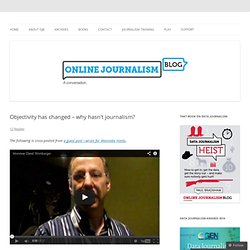
James O'Keefe Is Capitalizing on the Cult of Journalistic Objectivity - Conor Friedersdorf - Politics. His latest sting is yet more evidence that pretending reporters have no opinions or biases is no longer tenable Here's how Brooke Gladstone, host of the NPR show On the Media, summed up one obligation of professional journalists: "Checking your life at the door is -- at least for now -- a condition for working at traditional media news outlets.

When I interviewed Lianne Hanson as she retired from her host job, she said she was looking forward to being able to express herself freely and publicly in the world. " Is this a smart norm? It isn't, I argued in a recent post, and I want to return to it, because subsequent events have only reinforced the point. "It may seem like a good idea to avoid the 'perception of bias' by insisting that media employees hide who they are from the audience. And lo and behold, here is James O'Keefe Thursday with almost the exact inane hidden video sting I predicted. This is an era of diminished privacy. Image credit: Reuters. UNT talk-Objectivity in Journalism. University of North Texas Nature Writing Symposium talk: “Changing the World One Story at a Time” April 2007 Copyright © 2007 Wendee Holtcamp – bohemian@wendeeholtcamp.com Suppose you are given a bucket of water.
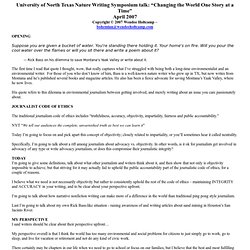
You're standing there holding it. -- Rick Bass on his dilemma to save Montana's Yaak Valley or write about it. The first time I read that quote I thought, wow, that really captures what I’ve struggled with being both a long-time environmentalist and an environmental writer. Principles of Journalism. The first three years of the Project’s work involved listening and talking with journalists and others around the country about what defines the work.

What emerged out of those conversations are the following nine core principles of journalism: 1. Journalism’s first obligation is to the truth Democracy depends on citizens having reliable, accurate facts put in a meaningful context. Journalism does not pursue truth in an absolute or philosophical sense, but it can–and must–pursue it in a practical sense. 2.
While news organizations answer to many constituencies, including advertisers and shareholders, the journalists in those organizations must maintain allegiance to citizens and the larger public interest above any other if they are to provide the news without fear or favor. 3. Journalists rely on a professional discipline for verifying information. 4. Objectivity (journalism) Journalistic objectivity is a significant principle of journalistic professionalism.
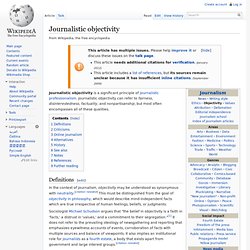
Journalistic objectivity can refer to fairness, disinterestedness, factuality, and nonpartisanship, but most often encompasses all of these qualities. Definitions[edit] Objectivity and Fairness - Objectivity and fairness in news stories. You hear it all the time – reporters should be objective and fair.
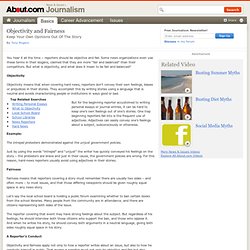
Some news organizations even use these terms in their slogans, claimed that they are more “fair and balanced” than their competitors. But what is objectivity, and what does it mean to be fair and balanced? Objectivity Objectivity means that when covering hard news, reporters don’t convey their own feelings, biases or prejudices in their stories. They accomplish this by writing stories using a language that is neutral and avoids characterizing people or institutions in ways good or bad. But for the beginning reporter accustomed to writing personal essays or journal entries, it can be hard to keep one’s own feelings out of one’s stories.
Example: The intrepid protesters demonstrated against the unjust government policies. Just by using the words “intrepid” and “unjust” the writer has quickly conveyed his feelings on the story – the protesters are brave and just in their cause, the government policies are wrong. Public Journalism and the Problem of Objectivity. Questioning Journalistic Objectivity. Journalism, as we've known it, has been mourned deeply over the last few years.
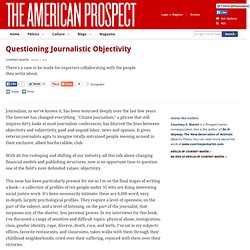
The Internet has changed everything. "Citizen journalism," a phrase that still inspires dirty looks at most journalism conferences, has blurred the lines between objectivity and subjectivity, paid and unpaid labor, news and opinion. It gives veteran journalists agita to imagine totally untrained people messing around in their exclusive, albeit hardscrabble, club. With all this reshaping and shifting of our industry, all this talk about changing financial models and publishing structures, now is an opportune time to question one of the field's most defended values: objectivity. This issue has been particularly present for me as I'm on the final stages of writing a book -- a collection of profiles of ten people under 35 who are doing interesting social justice work. Rethinking Journalism Ethics, Objectivity in the Age of Social Media. In response to the rapidly changing media environment, many schools and academic programs are offering novel approaches to journalism education.
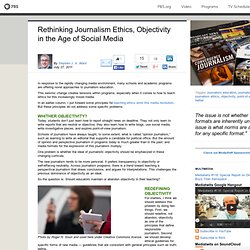
This seismic change creates tensions within programs, especially when it comes to how to teach ethics for this increasingly mixed media. In an earlier column, I put forward some principles for teaching ethics amid this media revolution. But these principles do not address some specific problems. Whither objectivity? Today, students don’t just learn how to report straight news on deadline.
Schools of journalism have always taught, to some extent, what is called “opinion journalism,” such as learning to write an editorial that supports a candidate for political office. The Myth of Objectivity in Journalism. By This page has been accessed since 29 May 1996.
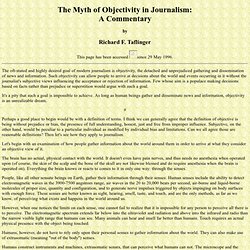
The oft-stated and highly desired goal of modern journalism is objectivity, the detached and unprejudiced gathering and dissemination of news and information. Such objectivity can allow people to arrive at decisions about the world and events occurring in it without the journalist's subjective views influencing the acceptance or rejection of information. Few whose aim is a populace making decisions based on facts rather than prejudice or superstition would argue with such a goal. It's a pity that such a goal is impossible to achieve. Perhaps a good place to begin would be with a definition of terms. The Myth of Objective Journalism. Bill Moyers Journal. Objective journalism - dead or drowned out? Alex Jones: Objectivity in Journalism. Objectivity in Journalism.
DAVID BROOKS There is some dispute about whether objectivity can really exist.

How do we know the truth? Well, I’m not a relativist on the subject. I think there is truth out there and that objectivity is like virtue; it's the thing you always fall short of, but the thing you always strive toward. And by the way, I think that opinion journalists have to be objective just as much as straight reporters. Opinion journalists, too, have to be able to see reality wholly and truly.
What are the stages of getting to objectivity? The second stage is modesty. The same thing has to happen for journalists. The third stage of objectivity is the ability to process data — to take all the facts that you've accumulated and honestly process them into a pattern. The fourth stage of objectivity is the ability to betray friends. The fifth stage of objectivity is the ability to ignore stereotypes. And the last bit, the sixth stage is a willingness to be a little dull.
David Brooks. Copyright © 2006 Imprimis. Bob Schieffer, Ron Paul and journalistic "objectivity" - Glenn Greenwald. CBS News‘s Bob Schieffer is the classic American establishment TV journalist: unfailingly deferential to the politically powerful personalities who parade before him, and religiously devoted to what he considers his own “objectivity,” which ostensibly requires that he never let his personal opinions affect or be revealed by his journalism. Watch how thoroughly and even proudly he dispenses with both of those traits when interviewing Ron Paul last Sunday on Face the Nation regarding Paul’s foreign policy views.